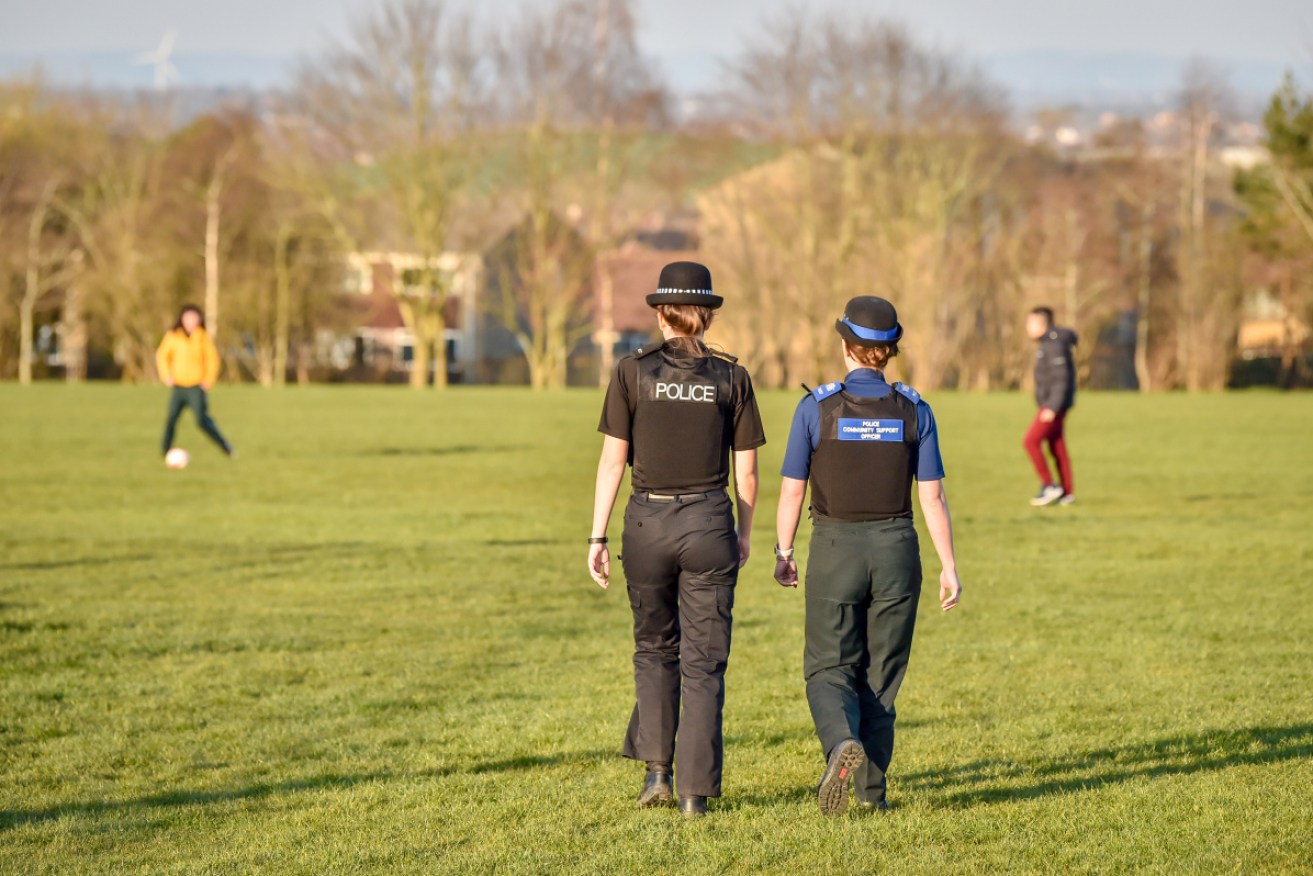What happens when coronavirus lockdowns go too far

British police officers patrol the parks in Bristol, UK to enforce the coronavirus lockdown rules. Photo: Getty
The tweet shows two silhouettes, extending in familiar policeman shapes.
The text is as cheery as a beat-walking bobby in an Edwardian children’s book: “If you think that by going for a picnic in a rural location no one will find you, don’t be surprised if an officer appears from the shadows!”
https://twitter.com/CentralBedsCPT/status/1249003469098319873
And the message, directed in this case to the inhabitants of Central Bedfordshire in England, is an example of how even when they are essential, anti-pandemic policies are always at risk of going a little bit insane.
I’m a sceptic, to put it mildly, of the sceptics of lockdowns and social distancing requirements.
At best they make an argument for more speed and optimism in reopening, not a case that there’s an alternative world where the US economy stayed open and steady while the virus was killing more people weekly than car crashes, flu or cancer and New York’s monthly death toll was climbing above that of September 2001.
But the sceptics’ determination to catalogue every petty tyranny inflicted in the name of quarantine is an important public service – not just because overreach always needs critics, but because petty tyrannies today are obstacles to the adaptation we need to get to semi-normalcy tomorrow.
The example of the British police hunting down picnickers even – or maybe especially? – when they deliberately head to isolated locales hits particularly close to home for me, because isolated streams and woods have been essential to my own family’s attempts to adapt to social distancing.
Every other day, weather permitting, my pregnant wife and I have been dragging our children to one or another Connecticut state park, all of which happily remain open for solo hikers and families.
Like good social-distancing citizens, we’ve tried to seek out the emptier ones, even if that requires an extra 30 minutes of driving, and we’ve managed to wring a little enjoyment for ourselves, and a lot of necessary exercise for our kids, from a situation where stir-craziness otherwise prevails.
This is a small example of what adaptation looks like, how people find ways to balance the public-health imperative of distancing and the public-health imperative of getting exercise and sun.
(As the architects of the Spanish flu’s open-air hospitals well knew, a population exposed to sunlight is a population more prepared to fight off a pandemic.)
And it’s excellent practice for life after the lockdowns begin to ease; even in a world where the local playground reopens, the semi-normal future will be a safer one if more parents take their kids hiking this summer and spend fewer hours clustered around the climbers and the swings.
So officials micromanaging outdoor time and exercise – chivying people out of parks if they’re doing the wrong thing (reading quietly instead of exercising, say) or closing an entire state’s worth of parks, as New Jersey’s governor chose to do last week – are cracking down on exactly the kind of creative and adaptive behaviours that a socially distanced society ought to be encouraging.
The same point applies to follies like the Michigan Governor (and Biden vice-presidential auditioner) Gretchen Whitmer issuing rules that don’t just distinguish between essential and non-essential businesses, but essential and non-essential products, which led to the strange spectacle of stores like Home Depot staying open but taping off their paint and gardening sections.
The Whitmer rule is particularly daft because an America that successfully adapted to social distancing would be a country with more home owners doing DIY projects, more people starting backyard gardens (victory gardens?) and more people making ends meet by picking up work that doesn’t require being indoors – work like, well, landscaping and house painting.
Every seed pack and paint can Home Depot sells is thus a small blow for semi-normalcy, for getting on with the forms of life that we can get on with, and a government that insists you can buy only food and paper towels is making its mission that much harder.
This doesn’t just apply to government policy.
The mayor of Louisville, Kentucky earned a lot of well-deserved flak, and a slapdown in court, for trying to prevent churches from holding drive-in services – not something I’m quite sold on liturgically, but still a creatively adaptive way to achieve semi-normalcy on Sunday morning.
But some religious authorities, too, have acted with anti-adaptive zeal.
In my own Catholicism, the diocese of Raleigh, North Carolina didn’t just cancel Masses and close churches; it forbade its priests to attempt experiments like drive-through confessions that might make social distancing and the sacraments compatible.
There is an understandable impulse lurking behind these overreaching moves: If we’re going to get the most out of this period of lockdown, to make its benefits worth the ample costs, we obviously want the lockdown to actually happen, to err on the side of safety instead of just shrugging every time someone breaks the rules.
But the rules need to seem reasonable, or else resistance will be normalised.
They need to seem time-bound and provisional: The governors and mayors making decisions on school closures on an every-few-weeks basis are being smarter than the officials pre-emptively cancelling everything from here until July.
And the rules need to allow people to be creative in confinement and to practise for the near-future when we’ll live in between, with certain aspects of normalcy restored but distance still an everyday requirement.
So if your lockdown ends up forbidding house painting and gardening and park-going and drive-through church, you’re setting your society up for failure once it ends.








